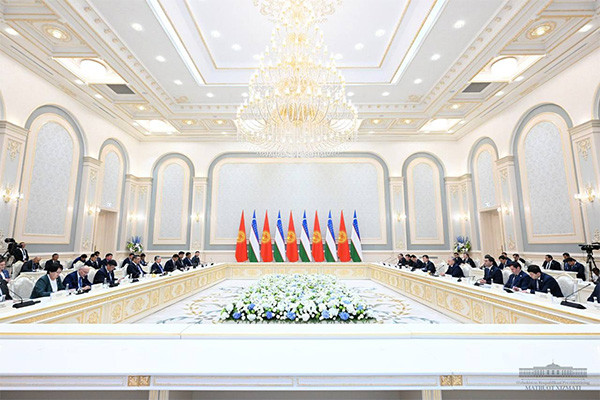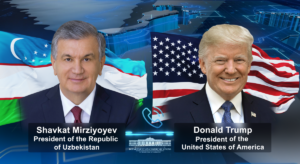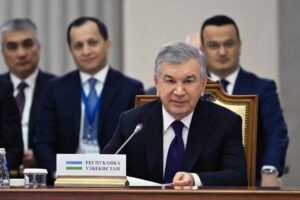Presidents of Uzbekistan and Kyrgyzstan Advance Bilateral Relations with Comprehensive Negotiations

Tashkent, The Gulf Observer: The President of the Republic of Uzbekistan, Shavkat Mirziyoyev, and the President of the Kyrgyz Republic, Sadyr Japarov, continued their negotiations in an expanded format, engaging official delegations from both nations. The discussions focused on strengthening cooperation across multiple sectors.
In preparation for the summit, a series of significant events were successfully conducted, including the Intergovernmental Commission meeting, a business forum, a Rectors’ Forum, a Generations Dialogue, and various cultural activities. These events laid the groundwork for the current discussions.
Key areas such as trade, industrial cooperation, energy, transport, agriculture, water management, security, and culture were critically analyzed. The parties agreed to maintain intensive contacts at the levels of parliaments, governments, ministries, agencies, regions, as well as business, expert, and public circles. Additionally, a decision was made to establish an Intergovernmental Council.
Both presidents emphasized the importance of continuing close interaction within international and regional structures, including the UN, SCO, Organization of Turkic States, Consultative Meetings of Central Asian Heads of States, and other multilateral platforms.
Specific measures to increase trade turnover, particularly through import substitution programs and support for cooperation projects, were discussed. A program to boost mutual trade volumes will be adopted during the visit. Trade houses will be established in both capitals, and an export-import contract portfolio will be developed to reach a target of US$2 billion in the coming years. Pre-export financing tools will be implemented, and a “green corridor” for expedited transportation of agricultural and livestock products will be launched.
The portfolio of active industrial cooperation projects has already reached US$300 million. A new package of trade contracts and investment agreements in energy, logistics, electrical engineering, textiles, agro-industry, and other sectors was adopted during the business forum held the day before. To promote these projects, the charter capital of the Uzbek-Kyrgyz Fund will be increased to US$200 million.
Cooperation in the energy sector was defined as a strategic direction. The importance of swiftly signing the agreement and commencing the practical phase of the Kambar-Ata HPP-1 construction project was emphasized. A comprehensive cooperation program for the development of small hydropower was also prepared, considering the potential of both countries.
The necessity of intensifying joint efforts to strengthen transport connectivity in the region was underscored. A historic event in this direction was the signing of a tripartite agreement on the strategic project of constructing the China-Kyrgyzstan-Uzbekistan railway. Prospective transport projects were reviewed during the meeting.
The regions of both countries are recognized as key drivers of trade and economic cooperation. An agreement was reached to continue active contacts within the framework of the Council of Governors of Border Regions under the chairmanship of the Prime Ministers. A schedule of mutual visits by regional delegations and an update of joint “road maps” will be prepared.
Agriculture was identified as an important area of interaction. This includes implementing an agro-cooperation program involving joint cultivation of crops, creation of intensive orchards, and agro-clusters. Active exchanges in the fields of culture, youth, tourism, education, science, and sports will continue. The successful conduct of the second Forum of Rectors of Higher Educational Institutions of Uzbekistan and Kyrgyzstan in Samarkand was noted with satisfaction.
An agreement was made to prepare a calendar of cultural events for the coming years. During the meeting, reports from the Deputy Prime Ministers with specific proposals on the trade and economic agenda were heard. Following the negotiations, the heads of states instructed the preparation of a joint “road map” and the establishment of mechanisms for the effective implementation of the agreements reached.


